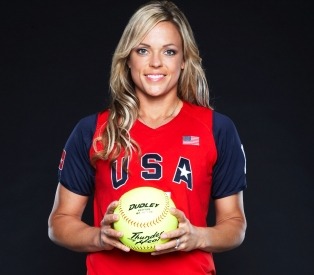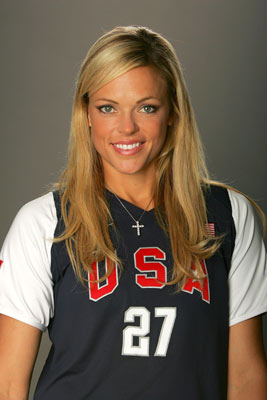Girls Softball Biography
Source(google.com.pk)
“You play like a girl!” used to be one of baseball’s classic insults. Not anymore. Softball diva Jennie Finch made it cool to not only throw like a girl, but to run, field and hit like one, too. Not since Babe Ruth has a player dominated so completely from the pitching rubber and the batter’s box, and she even gives the Bambino a run for his money in the charisma department. Jennie also accomplished something Ruth never could: She showed the boys it’s okay to be one of the girls. This is her story…
GROWING UP
Jennie Finch was born on September 3, 1980, in La Mirada, California. (Click here for a complete listing of today's sports birthdays.) Jennie’s parents, Doug and Bev, already had two boys, Shane and Landon. Both loved baseball and played competitively. It wasn’t until Jennie took up the game, however, that the family really got serious about it.
La Mirada offered organized ball on a year-round basis. Jennie joined her first league, L’il Miss T-Ball, after her fifth birthday. She was one of those kids who excelled at a number of sports, but her greatest love was always for baseball.
Bev and Doug soon began channeling this passion almost exclusively into girls’ softball. Their daughter had good hand-eye coordination and excellent speed. But it was her arm that opened the most eyes. During winter vacation in Iowa one year, she celebrated her first snowfall by packing a snowball and literally heaving it out of sight.
Jennie’s hometown was close to Dodger Stadium, where the Finches had season tickets on the third-base line. Bev, the baseball nut in the family, listened to Vin Scully on a pair of headphones while she took in the action. As soon as Jennie was old enough, she began accompanying her mom to Chavez Ravine, bleeding Dodger blue and rooting for heroes like Kirk Gibson, whose dramatic homer sparked LA to a World Series title a few weeks after Jennie turned eight.
Doug did whatever he could to accelerate his daughter’s progress. He constructed a batting cage in the backyard and hired a fast-pitch instructor for Jennie. Later, he transformed a small trampoline into a pitch-back she could use on evenings when he worked late.
As Jennie improved, her dad immersed himself in softball and became her personal coach. By the time she turned nine, she was playing for a 10-and-under traveling all-star team. Every weekend was spent at a different diamond somewhere in suburban Southern California. The more competitive the environment, the more Jennie thrived. At age 12, she led the California Cruisers to the 12-and-under American Softball Association national title in Chattanooga, Tennessee.
By now, Jennie’s life was focused almost exclusively on softball, though she also found opportunities to be a "normal" kid. She liked to shop, try on her mom’s makeup and hang out with her friends. In school, she was an excellent student. Still, softball consumed most of her free time. Every summer, the sport brought her to a new part of the country for a national tournament.
In 1995, Jennie’s ASA team captured the 14-and-under crown. During the summer of 1996, she rooted for the U.S. softball team as it rolled to Olympic gold in Atlanta. When the squad toured the country weeks later, Jennie waited on a long line to get Dot Richardson’s autograph. She dreamed of becoming an Olympic champ herself and swinging a Jennie Finch bat.
At La Mirada High School, Jennie made the varsity softball team as a freshman, earned the first of her four letters in the sport and helped the Matadores to the first of four straight Suburban League titles. During her high school career, she also lettered twice in basketball and volleyball, but the softball diamond is where she truly distinguished herself. Tall and lean, she was blessed with loads of natural talent and an intense desire to win.
As a sophomore, Jennie began amassing an impressive list on honors, including All-Suburban League, All-CIF Division II, and Whittier Daily News All-Area. The following year, she was selected league MVP. In the summer of 1997, she spearheaded a team that won the ASA 18-and-under championship.
Jennie continued her domination as a senior at La Mirada High. Between practice and games, softball was like a full-time job, and she enjoyed every minute of it. Her school’s Female Athlete of the Year, she was named to the Long Beach Press-Telegram’s Softball Dream Team and garnered the paper’s Player of the Year award. Jennie was a great hitter, but no one could touch her as a pitcher. In her four years as a Matadore, she went 50-12, with six perfect games, 13 no-hitters, and a 0.15 ERA. In 445 innings, she fanned 784 hitters.
Kirk Gibson card
Jennie made an impact at Arizona in her first year. The Wildcats entered the 1999 season under coach Mike Candera as a legitimate contender for the national title. Candrea’s team was young and talented. A pair of sophomores, Nicole Giordano and Toni Mascarenas, helped pace the offense. In the pitching rotation, Jennie teamed up with Becky Lemke for a formidable one-two punch.
Jennie’s adjustment to the college game took several starts. In summer tournaments, she had become accustomed to overwhelming opponents with hard stuff. Experienced Division-I hitters, however, could handle Jennie’s heater if they knew it was coming. In turn, she had to learn to mix her pitches more effectively. Jennie had a full arsenal—a left break and right break, a drop and a riser—it was now a matter of refining them. By May, she was feeling right at home. Her record stood at 19-6, and she was putting up some of her best performances against tough Pac-10 rivals.
When Candrea’s fab frosh wasn’t pitching, he penciled her in at first base, where she established herself as one of Arizona’s most dangerous hitters. Jennie finished the season as the team leader in doubles (14) and extra-base hits (21). Her seven homers were second best on the squad.
Jennie, however, was most impressive on the mound. With 24 victories, she came within one of tying Lemke’s freshman record. She saved some of her finest work for the Division-I Softball Championships. In the regional draw, she spun a no-hitter against Southwest Texas State. She then followed that gem with a one-hitter versus Kansas and a two-hitter versus Maryland. She also batted .353 with four doubles, a homer and six RBIs. For her efforts, Jennie was voted NCAA Region 2 Most Outstanding Player. Though Arizona stumbled in the Women’s College World Series, Jennie’s frosh campaign was a huge success.
Jennie's busy schedule resumed over the summer, as she played in a pair of international events. In the Junior Women’s World Championship, Team USA took the silver. Jennie later led her club team to a fourth-place finish at the Canada Cup.
Back in Tucson for the 2000 season, Jennie looked to build on her sparkling freshman performance. Again, she and Lemke combined to form one of the country’s nastiest pitching duos. In Arizona’s first nine games, they surrendered just seven earned runs in 54 innings.
Jennie was also swinging a hot stick. At one point, in fact, she strung together a 14-game hitting streak. Jennie ended her sophomore campaign with a .327 batting average and was tops on the Wildcats with 16 home runs. She earned first-team All-America and All-Pac 10 honors, but her hitting stats told only a portion of the story.
On the hill, Jennie established herself as Arizona’s ace. Overall, she went 29-2 with a 0.79 ERA,. As she had the year before, Jennie took it up a notch in the postseason. In the Regional Final, she fired three no-hitters in a row, blanking Tennessee Tech, Drake and Nebraska., and was named Most Outstanding Player for the second time. Unfortunately, the Wildcats stalled again in the WCWS.
Mike Candrea, 2004 ASA Postcard
After back-to-back years of postseason disappointment, Arizona was determined to go all the way in 2001. Candrea liked his team’s chances. His senior class, paced by Lemke, was the deepest in the country. She and Jennie were nearly automatic on the mound, while Giordano, Mascarenas and Lauren Bauer gave the Wildcats one of the most potent offenses in the college game.
Jennie, meanwhile, was gaining recognition as the finest two-way player in women’s softball. Her confidence brimming, she eagerly assumed a greater leadership role as the Wildcats steamrolled through the regular season. Jennie slammed 11 home runs (including three grand slams) and topped the team with 57 RBIs. In a victory over Oregon, she drove in nine runs, tying former Arizona slugger Laura Espinoza for the second-best single-game total in NCAA history. Jennie was even better when staring in at hitters. During one stretch, she fanned 10 or more in seven straight starts. She was particularly tough against Stanford, striking out 40 in three wins over the Cardinal.
Riding a 22-game winning streak, Arizona was the clear favorite heading into the WCWS. With a pair of aces (Jennie was a perfect 29-0 at this point) and a record 121 homers, the Wildcats featured the nation’s most intimidating squad. They opened the action in Oklahoma with two wins in a row, which set up an epic match against UCLA for all the marbles.
Candrea handed the ball to Jennie, while the Bruins turned to Amanda Freed, who hadn’t allowed a run in her last 34 innings. With the game scoreless in the fourth, Lindsey Collins finally snapped Freed’s shutout streak, blasting a solo shot to put Arizona ahead 1-0. That was all the support Jennie needed. When she blew away Toria Auelua for the game’s last out, the Wildcats poured onto the field and mobbed their star, who was named the WCWS Most Outstanding Player.
More honors awaited Jennie. A First Team All American, she received the Honda Softball Award as the National Player of the Year and was named the Pac-10 Pitcher of the Year. At 32-0, she posted a new mark for wins without a loss. Her ERA was a microscopic 0.54.
Jennie was far from done with softball in ’01. First, she led the Phoenix Storm to the ASA Major National Championship. Then her USA Blue Team captured the gold medal at the Pan Am Qualifier in Maracay, Venezuela. She struck out 27 in her two starts—both wins—and dropped a perfect game on Guatemala.
Girls Softball Pictures

Girls Softball Pictures

Girls Softball Pictures

Girls Softball Pictures

Girls Softball Pictures

Girls Softball Pictures

Girls Softball Pictures

Girls Softball Pictures

Girls Softball Pictures

Girls Softball Pictures

ReplyDeleteClick Here =>> Beautiful Telugu Hot Girls Pictures
Click Here =>> Indian Hot Girls Pictures
Click Here =>> Indian SeXy Girls Videos
Click Here =>> Pakistani Hot Girls Video Clips
Click Here =>> Pakistani Hot Girls Videos & Pictures
Click Here =>> Beautiful UnitedState Hot Girls Videos
Click Here =>> Beautiful U.S.A Hot Girls Pictures
Click Here =>> Beautiful New York Hot Girls HD Videos & Pictures
Click Here =>> Beautiful Korean Hot Girls Videos & Pictures
Click Here =>> American Hot Girls Videos & Pictures
Click Here =>> Beautiful Canadian Girls Hot Videos & Pictures
Click Here =>> Hot GirLs WORLD